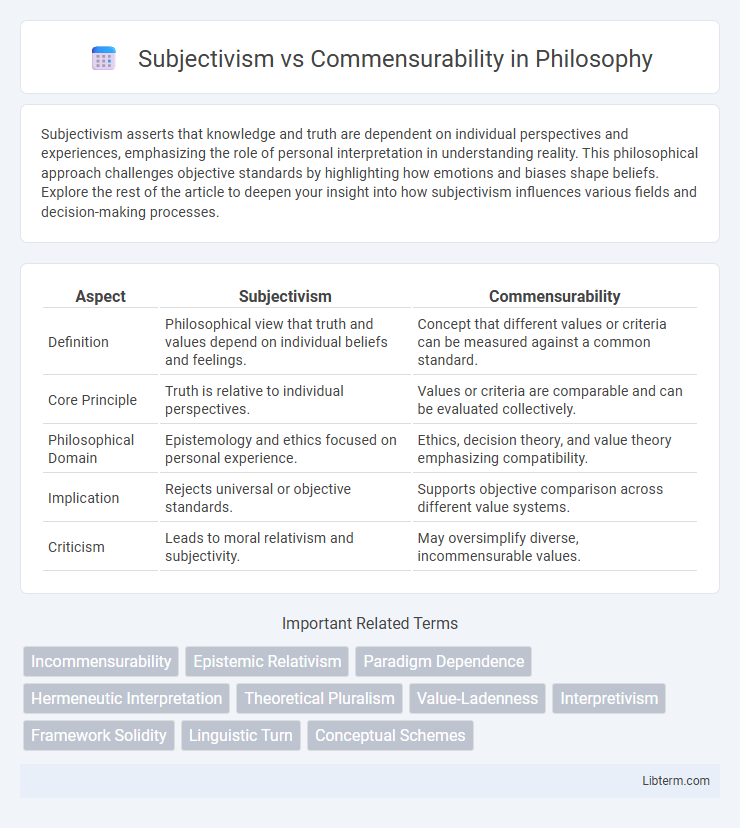Subjectivism asserts that knowledge and truth are dependent on individual perspectives and experiences, emphasizing the role of personal interpretation in understanding reality. This philosophical approach challenges objective standards by highlighting how emotions and biases shape beliefs. Explore the rest of the article to deepen your insight into how subjectivism influences various fields and decision-making processes.
Table of Comparison
| Aspect | Subjectivism | Commensurability |
|---|---|---|
| Definition | Philosophical view that truth and values depend on individual beliefs and feelings. | Concept that different values or criteria can be measured against a common standard. |
| Core Principle | Truth is relative to individual perspectives. | Values or criteria are comparable and can be evaluated collectively. |
| Philosophical Domain | Epistemology and ethics focused on personal experience. | Ethics, decision theory, and value theory emphasizing compatibility. |
| Implication | Rejects universal or objective standards. | Supports objective comparison across different value systems. |
| Criticism | Leads to moral relativism and subjectivity. | May oversimplify diverse, incommensurable values. |
Understanding Subjectivism: Core Principles
Subjectivism centers on the principle that all values and truths are rooted in individual perspectives and personal experiences, emphasizing the relativity of moral judgments. It asserts that reality and meaning are inherently tied to subjective interpretations rather than objective standards. This philosophical stance challenges the notion of universal criteria, highlighting the importance of personal consciousness in shaping beliefs and decisions.
Defining Commensurability: Key Concepts
Commensurability refers to the ability to compare different values, preferences, or measurements using a common standard or scale, enabling meaningful evaluation across diverse entities. Key concepts include the existence of a shared metric or unit that facilitates direct comparison, the notion that values can be quantified and ranked, and the assumption that such comparisons are objective and rational. Understanding commensurability is essential in contexts like ethics, economics, and decision theory where subjective opinions must be measured against universal criteria.
Philosophical Foundations of Subjectivism and Commensurability
Subjectivism in philosophy asserts that knowledge and truth are dependent on individual perspectives and experiences, emphasizing the intrinsic variability of human cognition. Commensurability, by contrast, involves the assessment of theories or values through a common standard, promoting objective comparison and evaluation. The philosophical foundations of subjectivism challenge the possibility of universal metrics, whereas commensurability underpins rational discourse through shared criteria and measurable standards.
Historical Context: Evolution of Both Perspectives
Subjectivism emerged prominently in the early 20th century as a philosophical stance emphasizing individual experience and interpretation, rooted in existentialist and phenomenological movements. Commensurability gained traction through the works of Thomas Kuhn and Willard Van Orman Quine, highlighting the possibility of comparing and translating different paradigms or languages despite conceptual shifts. Over time, debates between subjectivism and commensurability shaped epistemological frameworks, influencing discussions on relativism, objectivity, and the limits of cross-cultural or interdisciplinary understanding.
Epistemological Implications: Knowledge and Truth
Subjectivism challenges the notion of absolute truth by asserting that knowledge is inherently tied to individual perspectives and experiences, leading to relativism in epistemology. Commensurability, in contrast, supports the possibility of comparing and translating different knowledge systems, suggesting that objective standards or intersubjective criteria can bridge epistemic divides. The epistemological implications highlight a tension between understanding truth as context-dependent versus the pursuit of universal or shared knowledge frameworks.
Subjectivism in Ethics and Morality
Subjectivism in ethics asserts that moral judgments are based on individual preferences, emotions, or beliefs rather than objective standards. This perspective denies universal moral truths, suggesting that ethical principles are contingent upon personal or cultural viewpoints. Subjectivism challenges commensurability by arguing that moral values cannot be measured or compared across different subjects due to their inherently subjective nature.
Commensurability in Science and Rational Discourse
Commensurability in science ensures that competing theories can be measured against a common standard, enabling objective comparison and rational discourse. This concept facilitates the evaluation of scientific progress by providing shared criteria, such as empirical evidence and logical coherence, for theory assessment. Without commensurability, scientific debates risk devolving into subjectivism, where differing paradigms cannot be reconciled or meaningfully compared.
Comparing Subjectivist and Commensurable Frameworks
Subjectivist frameworks emphasize individual perspectives and personal experiences, highlighting the inherent variability in interpreting concepts like value or truth. Commensurable frameworks prioritize measurable standards, allowing comparison across different entities through common metrics or criteria. Comparing these approaches reveals a tension between qualitative variability and quantitative uniformity, influencing disciplines such as ethics, aesthetics, and economics.
Real-World Applications and Dilemmas
Subjectivism in ethics emphasizes individual perspectives, leading to diverse moral judgments that challenge universal standards, particularly in multicultural societies and international relations. Commensurability seeks measurable criteria to compare values or preferences, facilitating decision-making in policy, economics, and conflict resolution by establishing common ground. Real-world dilemmas arise when subjective values resist quantification, complicating efforts to apply commensurability in debates over cultural rights, environmental policies, and resource allocation.
Future Directions: Bridging or Deepening the Divide
Future directions in the debate between Subjectivism and Commensurability involve exploring frameworks that integrate subjective value judgments with objective comparison criteria to enhance decision-making models. Advances in cognitive science and artificial intelligence offer promising avenues to quantify subjective preferences while maintaining commensurable metrics for evaluation. Research efforts focus on developing hybrid methodologies that reconcile individual perspectives with universal standards, aiming to either bridge the philosophical divide or deepen the understanding of inherent epistemic tensions.
Subjectivism Infographic

 libterm.com
libterm.com